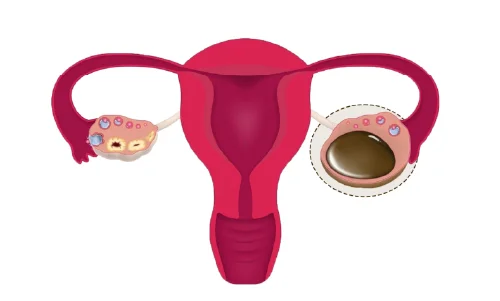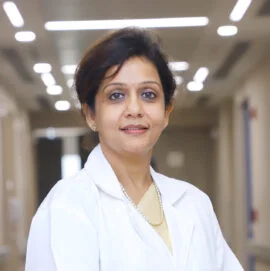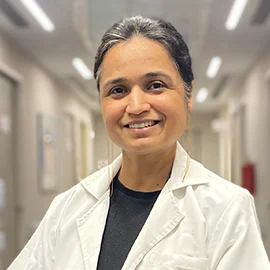- Home
- /
- Treatments
- /
- Endometrial Cyst Removal in Faridabad
Endometrial Cyst Removal in Faridabad
Endometrial cysts, also known as ovarian endometriomas or chocolate cysts, can cause significant discomfort and may lead to complications if left untreated. These cysts result from endometriosis, a condition where tissue similar to the lining inside the uterus (endometrium) grows outside the uterus. For expert diagnosis and treatment of endometrial cysts, consult with the top gynecologists at CK Birla Hospital in Gurgaon.
What is Endometrial Cyst?
Endometrial cysts form when endometrial tissue attaches to an ovary and creates a fluid-filled sac. This can lead to severe pelvic pain, irregular menstrual cycles, and fertility issues. Timely and proper treatment is essential to manage symptoms and prevent complications. Treatment options range from medication to surgical intervention, depending on the size and severity of the cysts and the patient's symptoms.
Endometrial Cyst treatment in Faridabad

Types of Endometrial Cysts
- Small Endometrial Cysts: Mostly asymptomatic, these cysts are often detected incidentally during a pelvic ultrasound.
- Moderate Endometrial Cysts: These cysts may cause pelvic pain, especially during menstruation, and can affect ovarian function.
- Large Endometrial Cysts: These cysts can lead to severe pain, significant menstrual irregularities, and fertility problems.
- Ruptured Endometrial Cysts: These cysts cause sudden, severe pain and can lead to internal bleeding and infection.
- Recurrent Endometrial Cysts: These cysts can persist or recur after treatment, requiring long-term management.
Types of Endometrial Cyst Treatments available
- Medication: Hormonal treatments such as birth control pills, GnRH agonists, and progestins to manage symptoms and reduce cyst size.
- Laparoscopy: Minimally invasive surgery to remove cysts while preserving ovarian tissue.
- Laparotomy: Open surgery for larger cysts or extensive endometriosis.
- Aspiration: Draining the cyst fluid under ultrasound guidance, usually for temporary relief.
- Pain Management: Nonsteroidal anti-inflammatory drugs (NSAIDs) to manage pain and discomfort.
Complications associated with untreated Endometrial Cysts
- Severe Pain: Chronic pelvic pain that can interfere with daily activities and quality of life.
- Infertility: Damage to the ovaries and fallopian tubes, affecting fertility.
- Rupture: Sudden, severe pain and internal bleeding requiring emergency treatment.
- Infection: Risk of pelvic inflammatory disease (PID) if a cyst becomes infected.
- Adhesions: Formation of scar tissue that can cause organs to stick together, leading to pain and complications.
Preventive Measures Against Endometrial Cysts
- Regular Medical Check-Ups: Early detection and management of endometriosis and cysts.
- Hormonal Therapy: Use of birth control pills or other hormonal treatments to manage endometriosis.
- Healthy Lifestyle: Maintaining a balanced diet, regular exercise, and stress management.
- Monitor Symptoms: Keep track of menstrual irregularities and pelvic pain.
- Medical Consultation: Seek medical advice for persistent pelvic pain or menstrual issues.
Minimally Invasive vs. open surgery Advantages
| Aspect | Minimally Invasive Surgery | Traditional Open Surgery |
| Incisions | Smaller incisions | Larger incisions |
| Recovery Time | Shorter recovery period | Longer recovery period |
| Pain and Scarring | Less pain and minimal scarring | More pain and noticeable scarring |
| Hospital Stay | Shorter hospital stay | Longer hospital stay |
| Infection Risk | Reduced risk of infection | Higher risk of infection |
Top Endometrial Cyst Specialist


Diagnosis of Endometrial Cysts
For accurate detection of endometrial cysts, a thorough medical examination by a gynecologist is essential. The doctor will review your medical history and may recommend the following tests:- Pelvic Ultrasound: To visualize the cysts and assess their size and location.
- MRI (Magnetic Resonance Imaging): For detailed imaging of the pelvic organs.
- Laparoscopy: Both diagnostic and therapeutic, allowing direct visualization and treatment of cysts.
- Blood Tests: To check for elevated levels of CA-125, a marker associated with endometriosis.
Pre-Treatment/Surgery Instructions
- Follow the doctor’s instructions for medication.
- Avoid consumption of alcohol and tobacco.
- Doctors often instruct avoiding food or drink 8 hours prior to surgery.
- Make sure you have a caregiver with you post-surgery.
Post-Surgery Instructions
- The patient will be observed for a few hours post-surgery.
- Hospital discharge typically occurs on the same day or the next day, depending on the surgery type and recovery progress.
- Follow-up appointments will be scheduled to monitor recovery.
- Avoid strenuous activities and follow a balanced diet to aid recovery.
Recovery After Endometrial Cyst Treatment
Recovery time depends on the type of treatment or surgery performed. Generally, patients can expect:- Initial recovery within 1-2 weeks for minimally invasive surgery.
- Full recovery and return to normal activities within 4-6 weeks.
- Improvement in symptoms and overall quality of life after the initial recovery phase.
Be a super-mom, stay informed about pregnancy health updates with our weekly newsletter
[contact-form-7 id=”16292″ title=”Subscribe”]
FAQs About Endometrial Cyst treatment
Average Cost of Various Endometrial Cyst Treatments
How long does the recovery take after Endometrial Cyst Surgery?
Recovery time varies based on the type of surgery. Minimally invasive procedures like laparoscopy typically require 1-2 weeks for initial recovery, while open surgery may take 4-6 weeks.
Can Endometrial Cysts recur after treatment?
Yes, endometrial cysts can recur even after treatment. Long-term management, including hormonal therapy and regular monitoring, is often necessary to reduce the risk of recurrence.
Are there Non-Surgical treatments for Endometrial Cysts?
Yes, non-surgical treatments include hormonal therapies such as birth control pills, GnRH agonists, and progestins to manage symptoms and reduce cyst size. Pain management with NSAIDs is also commonly used.
Is Endometrial Cyst treatment covered by Insurance?
Most health insurance plans cover endometrial cyst treatment, including surgery and medication. It is important to check with your insurance provider for specific coverage details and any potential out-of-pocket costs.
What are the Signs that an Endometrial Cyst has Ruptured?
Signs of a ruptured endometrial cyst include sudden, severe pelvic pain, abdominal tenderness, nausea, vomiting, and sometimes fainting or dizziness. Seek immediate medical attention if you experience these symptoms.
Can Endometrial Cysts affect Pregnancy?
Yes, endometrial cysts can affect fertility and pregnancy. They can interfere with ovarian function and the normal anatomy of the reproductive organs. Treatment can improve fertility outcomes, and it is essential to discuss family planning with your gynecologist.







